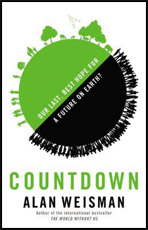"In every village, women churn out babies, trying to stay ahead of death. The only thing that checks Niger's world-highest fertility is its fifty-year life expectancy. In the town of Madaoua in Tahoua region, between Maradi and Niger's capital, Niamey, gray-bearded elders in loose turbans and sweat-stained prayer caps gather under a thatched portico. It is the first meeting with their new mayor, who wears a tall white prayer cap embroidered with a pattern of diamonds. The sultan of Tahoua, resplendent in white and gold, is also present. At a respectful distance behind the men stand women in a rainbow of head scarves.
"They are discussing the drought that now never seems to end.
" 'Forty years ago,' says the sultan, 'it rained here five months a year. But since 2000, the climate change caused by Western countries has dried our rains. Children, cattle, even goats have died. People are fleeing to Nigeria, refugees from a war against the Sahel with no enemy to strike back at. What can be done?'
"Even in the West, there is no technology to tame the unleashed climate. Have they considered family planning, to reduce the numbers that the lands must sustain?
"The men explode with laughter. 'Everyone here has more than one wife,' says the sultan, who has four.
" 'You can't ask a father to stop having children without a solution for who will work on his farm,' protests a white-turbaned elder.
" 'If you have children, God answers to their needs,' says the new mayor. 'I myself have thirty-three.'
"His potency is well known, and admired. But the meeting falls silent, as if it penetrates that this is no longer the land these man grew up in. In the past, there was room and grass aplenty for all the children a man could have. Then, in just twenty years, the trees are gone and only people are left.
" 'We have entered different times,' says the sultan. 'Maybe we have to think differently.' "
